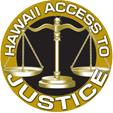On June 24, 2011, the Hawaii Access to Justice Commission held its third annual Access to Justice Conference at the William S. Richardson School of Law, University of Hawaii, Manoa campus. The theme for the 2011 conference was “ACCESS TO JUSTICE: Pursuing a Noble and Necessary Purpose.” There were over 230 people in attendance. Judge Daniel R. Foley, Chair of the Hawaii Access to Justice Commission (“Commission”), presented Certificates of Appreciation to Gary Slovin and Mihoko Ito, both members of the Commission’s Legislative Panel Committee, who were instrumental in coordinating support for S.B. 1073, increasing the surcharges on the filing fees that go into the Indigent Legal Assistance Fund. Hawaii Supreme Court Associate Justice Simeon Acoba, former Chair of the Commission presented a Certificate of Appreciation to the Goodsill Anderson Quinn & Stifel Firm for its support of the Commission’s mission.
The Funding Challenges panel featured Speaker Calvin Say, Senator Clayton Hee, and Representative Marcus Oshiro and they were candid in discussing the fiscal concerns of the Legislature. Judge Lora Livingston presented a lively and thought-provoking speech filled with humor as well as specific suggestions about the leadership of judges and possible collaborative partnerships in the pursuit for equal justice.
The morning concurrent workshops led by former Judge Michael Broderick on “Pushing the Envelope of Judicial Involvement” and by David Reber on “Creating Innovative Partnerships in the Pursuit for Equal Justice” stimulated a good deal of audience engagement. Justice Acoba and Judge Trudy Senda helped launch the Judicial Involvement workshop. Jenny Fujinaka, the Supreme Court law librarian, provided information about resources available for self-represented litigants and discussed locating self-help centers in libraries throughout the state. Dr. Chris Derauf and Dina Shek, who established a Medical-Legal partnership for children at the Kōkua Kalihi Valley Comprehensive Family Services (KKV), a community health center, explained their collaborative process. Alex Santiago, executive director of PHOCUSED (Protecting Hawaii’s Ohana, Children, Under Served, Elderly and Disabled), and Victor Geminiani, a board member of that organization, explained how partnerships with social workers and human services agencies offer another promising partnership model.
The five concurrent workshops for the first afternoon session included:
- Initiatives to Enhance Civil Justice led by Judge Greg Nakamura, Nalani Fujimori Kaina, Michelle Moorhead, and Linda Krieger
- How to Get to Yes with Pro Bono led by L. Dew Kaneshiro and Jeanilou Torrado
- The New Paralegal Paradigm and Access to Justice led by Elton Johnson
- Mediation Effectiveness: When to Use and How to Make it Work led by Tracey Wiltgen
- Access to Justice for Individuals with Disabilities led by John Dellera and Jean Johnson
In the last part of the afternoon, thee were six concurrent workshops as follows:
- Access to Justice for the Elderly led by James Pietsch, Lenora Lee, and Scott Suzuki
- Ensuring Court Access to Persons with Limited English Proficiency led by Jennifer Rose and Melody Kubo
- The Foreclosure Crisis: How to Help led by Bankruptcy Judge Robert Faris and George Zweibel
- Access to the Family Court led by Circuit Court Judge R. Mark Browning and Elizabeth Paek
- Access to Justice for Native Hawaiians led by Moses Haia
- Self Help Centers led by Rodney Maile and Shannon Wack
Copies of the conference agenda and Judge Livingston’s keynote address are noted below:
Agenda for the 2011 Access to Justice Conference
Keynote address by Judge Lora Livingston at the 2011 Access to Justice Conference
